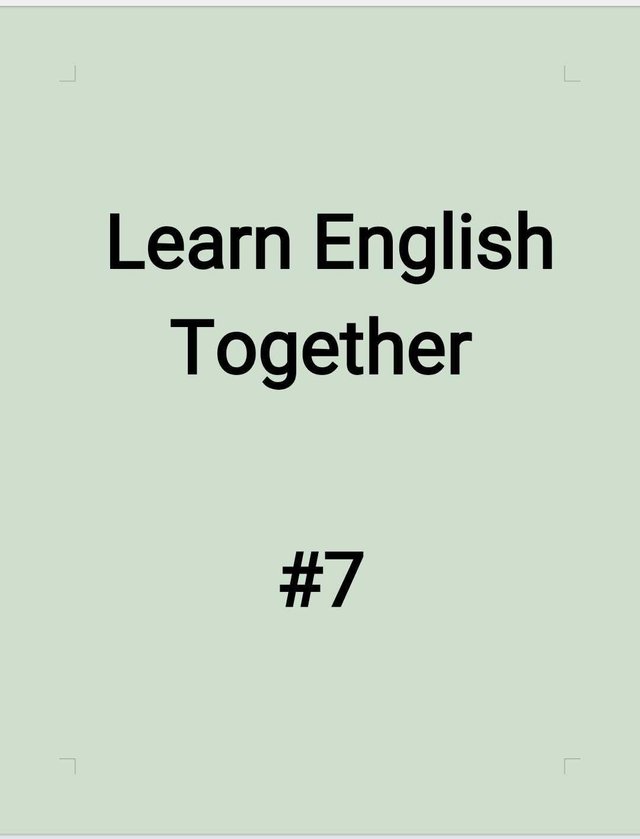Common Mistake In English #7 ( Misused Of The Infinitve )
Selamat pagi teman-teman. Bagaimana dengan lesson yang lalu? Mudah bukan? Nah, Mari melanjutkan ke lesson berikutnya..

Today I continue the previous post to section seventh Here are some easy examples for you to practice wherever you are, and I believed you gonna love them. for those of you who do not know yet, maybe this can be useful.
** Loen persembahkan keu rakan-rakan syehdara loen bandum Aneuk Nanggroe semoga beu jeut keu manfaat. **
(Misuse of the infinitive)
Use the gerund and not the infinitive !
** A . After prepositions or preposition phrases: **
Without + ing.
Don't say: Do your work without to speak.
Say: Do your work without speaking.
Instead of + ing.
Don't say: He went away instead to wait.
Say: He went away instead of waiting.
** B. After words which regularly take a preposition: **
Capable of + -ing.
Don't say: They're quite capable to do that.
Say: They're quite capable of doing that.
Note: Also incapable of; to + ing the infinitive follows able or unable. He's unable to do anything
Fond of + ing.
Don't say: She's always fond to talk.
Say: She's always fond of talking.
Insist on + ing.
Don't say: Randy insisted to go to London.
Say: Randy insisted on going to London.
Object to + ing.
Don't say: I object to be treated like this.
Say: I object to being treated like this.
Prevent from + ing.
Don't say: The rain prevented me to go.
Say: The rain prevented me from going.
Succeed in + ing.
Don't say: Mayo succeeded to win the prize.
Say: Mayo succeeded in winning the prize.
Think of + ing.
Don't say: I often think to go to England.
Say: I often think of going to England.
Tired of + ing.
Don't say: The customer got tired to wait.
Say: The customer got tired of waiting.
Used to + ing.
Don't say: She's used to get up early.
Say: She's used to getting up early.
** C. After certain verbs: **
Avoid + ing.
Don't say: You can't avoid to make mistakes.
Say: You can't avoid making mistakes.
Note: Also can't help (can't avoid). I can't help laughing.
Enjoy + ing.
Don't say: I enjoy to play guitar
Capable of + -ing.
Don't say: They're quite capable to do that.
Say: They're quite capable of doing that.
Note: Also incapable of; to + ing the infinitive follows able or unable. He's unable to do anything
>>>Fond of + ing.
Don't say: She's always fond to talk.
Say: She's always fond of talking.
>>>Insist on + ing.
Don't say: Randy insisted to go to London.
Say: Randy insisted on going to London.
>>>Object to + ing.
Don't say: I object to be treated like this.
Say: I object to being treated like this.
>>>Prevent from + ing.
Don't say: The rain prevented me to go.
Say: The rain prevented me from going.
>>>Succeed in + ing.
Don't say: Mayo succeeded to win the prize.
Say: Mayo succeeded in winning the prize.
>>>Think of + ing.
Don't say: I often think to go to England.
Say: I often think of going to England.
>>>Tired of + ing.
Don't say: The customer got tired to wait.
Say: The customer got tired of waiting.
>>>Used to + ing.
Don't say: She's used to get up early.
Say: She's used to getting up early.
>>** C. After certain verbs: **
>>>Avoid + ing.
Don't say: You can't avoid to make mistakes.
Say: You can't avoid making mistakes.
Note: Also can't help (can't avoid). I can't help laughing.
>>>Enjoy + ing.
Don't say: I enjoy to play guitar
Say: I enjoy playing guitar
Note: Use the gerund or to + infinitive after verbs meaning to like or to dislike.
He likes reading English books, or He likes to read English books.
Excuse + ing.
Don't say: Please excuse me to be so late.
Say: Please excuse my being so late.
Or: Please excuse me for being so late.
Finish + ing.
Don't say: Have you finished to speak?
Say: Have you finished speaking?
Note; to + infinitive or the gerund follow verbs meaning "to begin".
She began to speak, or She began speaking.
Go on (continue) + ing.
Don't say: The music went on to play all day.
Say: The music went on playing all day.
Note: Also keep on; She kept on playing the piano.
Mind (object to) + ing.
Don't say: Would you mind to open the door?
Say: Would you mind opening the door?
Thank you for reading.
If you found any mistakes of these phrases, don't forget to leave the comment below and be my guest. Don't forget to stop by and see you to next post.